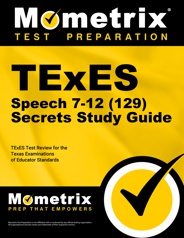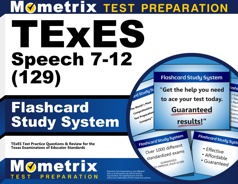The TExES Speech 7-12 exam is an assessment test designed to test the knowledge of entry-level educators in the state of Texas.
Click “Start Test” above to take a free TExES Speech 7-12 (129) practice test, and check out our premium-quality TExES test prep resources by clicking the links below!
TExES Speech 7-12 Exam Outline
The TExES Speech 7-12 exam contains a total of 100 selected-response questions and one constructed-response question, and you will be given 4 hours and 45 minutes to complete it.
Teaching Standards
The TExES Speech 7-12 exam is aligned with the 12 standards for educators that have been outlined by the State Board for Educator Certification.
Click the button below to see the full list of approved educator standards:
Approved Educator Standards
Standard I: You are expected to know how to design and implement effective instruction that is appropriate for all students.
Standard II: You are expected to understand the importance of using accurate and complete information as a basis for critical thinking, reasoning, decision-making, speaking, and listening.
Standard III: You are expected to understand the communication process and related theories and know the purposes and functions of communication.
Standard IV: You are expected to understand the influence of self and culture in making communication choices that determine the effectiveness of communication in interpersonal, group, organizational and public contexts.
Standard V: You are expected to understand oral language, listening, and nonverbal communication skills and know how to analyze communication interactions.
Standard VI: You are expected to understand interpersonal communication and teach students to apply appropriate and effective verbal, nonverbal, listening, and responding skills in interpersonal interactions in varied contexts.
Standard VII: You are expected to understand group and organizational dynamics and skills for communicating in groups and organizations.
Standard VIII: You are expected to understand concepts and principles of classical and contemporary rhetoric and teaches students how to plan, prepare, organize, deliver, and evaluate speeches and presentations.
Standard IX: You are expected to understand argumentation and debate and provide students with opportunities to apply skills and strategies for argumentation and debate in a variety of formats and contexts.
Standard X: You are expected to understand the art of oral interpretation and provide opportunities for students to develop and apply oral interpretation skills.
Standard XI: You are expected to know how to interpret, analyze, and produce various types of mass media messages.
Standard XII: You are expected to understand ethical standards and major legal issues relevant to varied communication contexts, and teach students about the importance of freedom of speech in a democratic society and the rights and responsibilities of communicators.
Exam Domains
The exam is split into three domains, each of which covers multiple standards mentioned above.
| Domain | Percentage of Exam | Standards Used |
|---|---|---|
| 1. Communication Processes | 31% | II-IV, XI, and XII |
| 2. Speaking and Listening in Different Contexts | 38% | V-X |
| 3. Speech Education | 31% | I-XII |
1. Communication Processes (31%)
For the questions in this domain, you will be tested on your knowledge and abilities in the following areas:
- The communication process and related theories
- Factors that influence communication choices
- The importance of using accurate and complete information as a basis for critical thinking, reasoning, decision-making, effective listening, and speaking
- Interpreting, analyzing, and producing various types of media messages
- Ethical standards and major legal issues relevant to various communication contexts
2. Speaking and Listening in Different Contexts (38%)
For the questions in this domain, you will be tested on your knowledge and abilities in the following areas:
- Oral language, listening, and nonverbal communication skills
- Concepts and principles of classical and contemporary rhetoric
- Concepts and principles of argumentation and debate
- Concepts and principles of oral interpretation
- Interpersonal communication skills as they are applied in a variety of contexts
- Group and organizational dynamics and skills for communicating in groups and organizations
3. Speech Education (31%)
For the questions in this domain, you will be tested on your knowledge and abilities in the following areas:
- Instruction that is appropriate for all students
- Methods for designing and implementing speech instruction related to communication processes and choices, ethics, mass media, and the evaluation and use of information
- Methods for designing and implementing speech instruction related to information and oral interpretation
- Methods for designing and implementing speech instruction related to rhetoric and debate
- Methods for designing and implementing speech instruction related to interpersonal and group communication
Check Out Mometrix's TExES Speech 7-12 Study Guide
Get practice questions, video tutorials, and detailed study lessons
Get Your Study Guide
Exam Registration
To register for the exam, you must create an online NES account via their website. Once your account has been created, you can use it to register for the exam and schedule an exam date. When you register, you will need to pay the $116 examination fee.
How to Study
Think you aren’t a good test-taker? Maybe on a study-time crunch? Or just don’t know how to begin studying? Mometrix has designed a new Study Secrets course to help every student, no matter what study scenario you are in. Here’s what you’ll find in the Study Secrets Course:
- Techniques to Conquer Procrastination
- Steps to building a Study Plan custom to your learning style
- 7 Effective Note-Taking Methods
- Test-Taking Tips
- Memory Techniques and Mnemonics
- And much more!
Everyone learns differently, so we’ve tailored our Study Secrets Course to ensure every learner has what they need to prepare for their upcoming exam or semester. Click below to check it out!
Test Day
On exam day, you should arrive at the testing center 30 minutes early on the day of your testing appointment. Upon arrival, you will be asked to sign in and provide at least one form of valid photo ID.
After the check-in process is complete, you will be asked to leave all personal items (cell phone, wallet, keys, etc.) in a locker outside the testing area.
Once you enter the testing room, you will be given a brief tutorial on the computer-adaptive testing system before the exam begins.
How the Exam is Scored
The TExES Speech 7-12 exam is computer-adaptive. Here’s a look at how it works:
The first question is judged to be of medium difficulty, and depending on your performance, the next question may be easier or harder. If you do well on the first question, the second question will be harder; conversely, if you do poorly on the first question, the second question will be easy.
The questions on this exam are rated on a scale of 100-300. The higher a question is rated, the harder the question is (e.g., a question marked as 285 will be more difficult than a question marked 235).
To pass the exam, your final question must be on or above the 240 mark. If your final question is below this mark, you will not pass the exam, even if you have answered some questions above the 240 mark at some point during the exam. This is because the computer has rated the difficulty of your final question based on how you answered the previous questions.
Check Out Mometrix's TExES Speech 7-12 Flashcards
Get complex subjects broken down into easily understandable concepts
Get Your Flashcards
FAQs
Q
How many questions are on the TExES Speech 7-12 exam?
A
There are 100 selected-response questions on the exam.
Q
How long is the TExES Speech 7-12 exam?
A
The time limit for the exam is 4 hours and 45 minutes.
Q
What is the passing score for the TExES Speech 7-12 exam?
A
To pass the exam, you must achieve a minimum scaled score of 240.
Q
How much does the TExES Speech 7-12 exam cost?
A
The examination fee is $116.
function toggle(obj) {
var obj=document.getElementById(obj);
if (obj.style.display == “block”) obj.style.display = “none”;
else obj.style.display = “block”;
}

